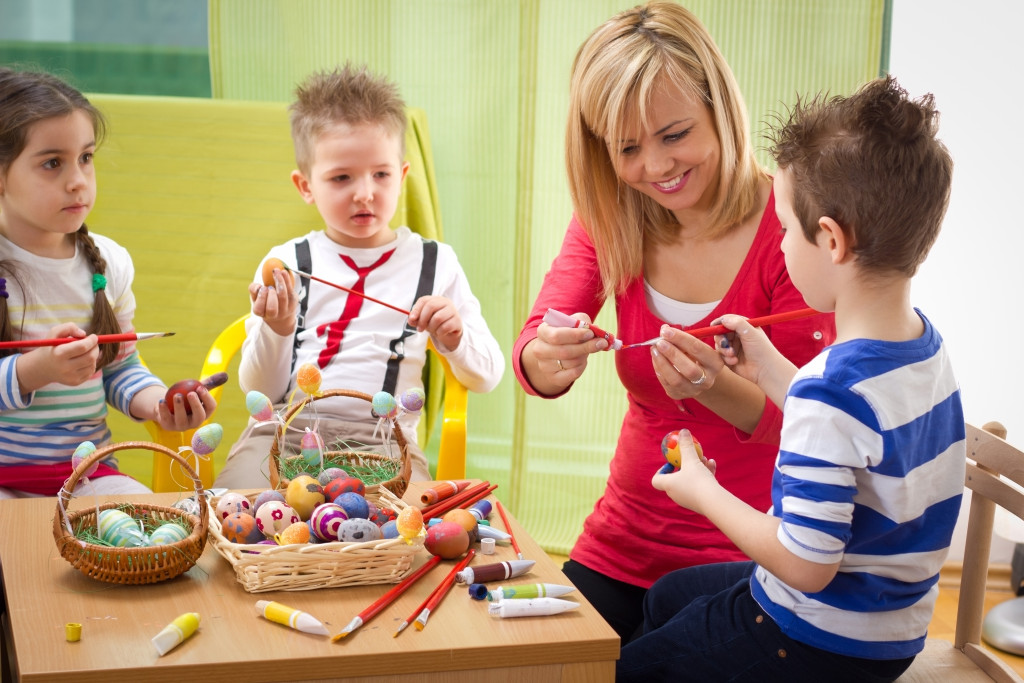- Parents must set a positive example of good manners and respect for others.
- Praise your child’s good social behavior and avoid criticizing it.
- Teach your child empathy and respect for others.
- Model ways to handle conflict appropriately.
- Encourage opportunities for socialization, such as playing with other children and taking them out into the community.
Being able to interact with others meaningfully is an essential life skill. It helps children form relationships, learn new skills, and build confidence. As a parent, you can help your child develop their social skills by setting a positive example and providing opportunities for them to practice these skills. This guide will provide you with five practical tips on encouraging and developing social skills in your child.
1. Setting a Positive Example for Your Child
As old age goes, actions speak louder than words. Children look up to their parents as role models for their behavior — so you must set a good example of how to act around others. Speak kindly about others, display good manners, and respectfully handle disagreements. Doing this will help your child understand the importance of treating others with kindness and respect.
It’s also beneficial for parents to show their children that socializing can be enjoyable. Invite friends and family for dinner or plan fun activities where everyone can get together — this will show your child that interacting with others can be a positive experience.
2. Praising Good Social Behavior

When your child acts appropriately around other people, reward them by praising their behavior. Acknowledge when they’re being polite, kind, or helpful — this will reinforce those behaviors and encourage them to continue acting in socially appropriate ways. Additionally, avoid criticizing their behavior when they make a mistake. This can have the opposite effect and decrease their social confidence.
3. Teaching Empathy and Respect for Others
Being able to put yourself in someone else’s shoes is an important factor in socializing well with others. Helping your child understand different perspectives and points of view will better equip them to interact with other people appropriately. Talk to them about how other people might be feeling or thinking — this will help them appreciate what it’s like for someone else when they are being treated poorly or unfairly. Explain why it’s essential to treat everyone with respect, no matter who they are or where they come from.
4. Modeling Appropriate Ways to Handle Conflict
Disagreements will inevitably arise between people. Teaching your child how to manage conflict appropriately will benefit them as they get older and interact with more people. Showing your child the importance of negotiating and compromising can help them handle difficult conversations or confrontations, leading to a more harmonious relationship. Additionally, demonstrate how important it is to stay calm and composed when dealing with conflicts. This way, you’ll be helping your child learn valuable and necessary life skills about handling arguments appropriately.
5. Encourage Opportunities for Socialization

Opportunities for socializing come in many forms. Allowing your child to have positive and meaningful interactions with others will help them build their social skills. Provide them with chances to practice what they’ve learned.
Here are some ways you can encourage opportunities for socialization:
Let Them Play With Others
Encourage your child to spend time playing with other children. This could include attending after-school activities, joining a sports team, or simply inviting friends for playdates. Not only will they learn important social skills from their peers, but it’s also an opportunity to build meaningful relationships that can last a lifetime.
Take Them Out into the Community
Take your child out in the community and let them get acquainted with different cultures and environments. Have them join you at the grocery store or local park or attend family events, like birthdays or holidays. Seeing how others interact and learning to behave in public will help your child build essential social skills such as communication and collaboration.
Consider Child Care Options
If you need to leave your child with someone else for an extended period, consider enrolling them in reliable child care centers. It will give your child more opportunities for socialization — especially during after-school hours — and give them structure and routine, which are essential for developing social skills.
Enroll Them in Workshops or Classes
Enrolling your child in classes or workshops that involve activities with peers can be a great way to help them build social skills. Your child can practice working with others through art, music, and drama. Plus, these activities provide an enjoyable and engaging experience for kids, which can help foster their positive interactions with their peers.
Final Words
Providing an environment where your child can learn and develop their social skills is essential. This way, they’ll be better equipped for a future of meaningful relationships and successful communication. With the five tips mentioned above, hopefully, you feel more empowered to encourage and develop social skills in your child!




